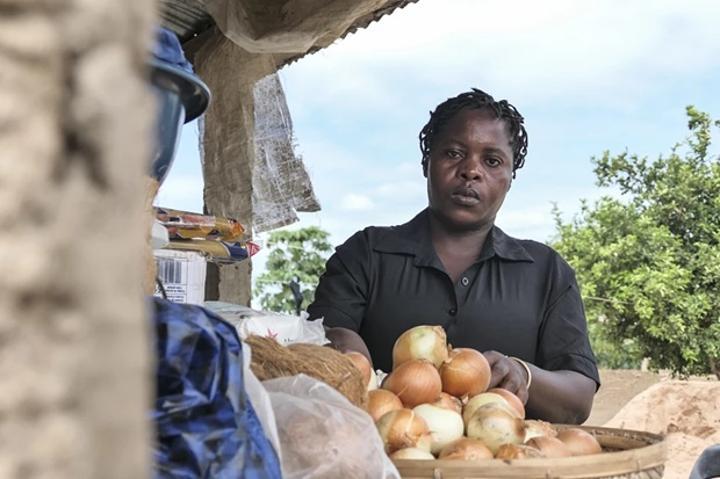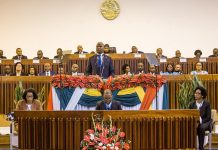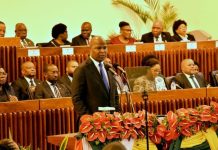
Africa-Press – Mozambique. Inês’ tears reveal the pain of a woman who saw her husband, a Mozambican police officer, die days after being hit by two “stray bullets” on a night of protests in Maputo.
“My husband died a week after being shot (…) The doctor discharged us, but when we arrived at our house, it didn’t even take one hour, he lost his life,” Inês Guambe told Lusa, at her home, on the outskirts of Maputo, still in mourning.
In plain clothes, Belmiro Guambe, a member of the Rapid Intervention Unit (UIR), was not on duty when he was shot in the arm and ribs, at the door of his home, on the night of December 9, minutes after leaving a group of friends with whom he was socializing.
At his funeral, the authorities determined that Guambe died after being hit by “stray bullets” during a police operation to stop groups of people protesting against the October 9 election results in the Luís Cabral neighbourhood, on the outskirts of Maputo, but his wife’s version of events is different.
“He was trying to open the gate when he was approached by a police officer. (…) He knelt down and identified himself. He told the police officer that he was a colleague. But they accused him of being among the protesters and shot him. (…) He fell into the yard. He shouted my name and I came out,” says Inês, adding that she saw the person who fired the shots, which also hit a window in the couple’s home. After days in hospital, the 34-year-old officer, who had spent seven years of his life in the force, succumbed to his injuries and died on December 16, at home.
The doctors who treated him told his family that shrapnel from the bullets that hit him had scattered across his chest.
“I feel bad because, first of all, before being a police officer, he was a human being. And that day he asked them not to shoot and, even so, they did,” added his widow.
Two months have passed since the death of the man with whom Inês had lived for more than ten years and, although she is still haunted by the image of Guambe lying on the ground in the backyard of her house, her ambition is to start over, since “life has to go on”.
Today, living in the home of relatives more than 50 kilometres from the centre of the Mozambican capital, Inês has a small business, but, without Guambe, “life is difficult”, especially because, currently, she has no support.
The funeral ceremonies were paid for by the authorities and the widow also had the support of the “Geração 18 de Março” movement, a group of young volunteer activists who have supported the victims of the post-election protests, but she currently depends solely on the profits from a makeshift stall on the balcony of her house.
“It’s not easy. I depended on him a lot,” the widow admits.
Like Inês, according to the Mozambican Police Association, dozens of wives of Mozambican police officers have lost their lives in the last three months of protests in Mozambique, some of whom were killed by the population itself, in retaliation for actions described as repressive by the communities.
“We have several women who have become widows and children who have become orphans because their parents were murdered on duty,” Nazário Muanambane, president of the association, told Lusa.
The latest figures released by the General Command of the Mozambican Police on 27 January revealed that at least 17 police officers had died and 187 had been injured during the demonstrations, which also led to the destruction of 77 district police stations.
Mozambique has been experiencing a climate of strong social unrest since October, with demonstrations and strikes called first by former presidential candidate Venâncio Mondlane, who rejects the election results that gave victory to Daniel Chapo, supported by the Mozambique Liberation Front (Frelimo), the ruling party.
Currently, small-scale protests have been taking place in different parts of the country and, in addition to contesting the results, the people are complaining about the rising cost of living and other social problems.
Since October, at least 327 people have died, including around two dozen minors, and around 750 have been shot during the protests, according to the electoral platform Decide, a non-governmental organisation that monitors the electoral processes.
For More News And Analysis About Mozambique Follow Africa-Press





